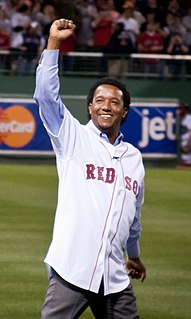A Quote by Oscar Wilde
Related Quotes
Man is a rational animal—so at least I have been told. … Aristotle, so far as I know, was the first man to proclaim explicitly that man is a rational animal. His reason for this view was … that some people can do sums. … It is in virtue of the intellect that man is a rational animal. The intellect is shown in various ways, but most emphatically by mastery of arithmetic. The Greek system of numerals was very bad, so that the multiplication table was quite difficult, and complicated calculations could only be made by very clever people.
The soul has two parts, one rational and the other irrational. Let us now similarly divide the rational part, and let it be assumed that there are two rational faculties, one whereby we contemplate those things whose first principles are invariable, and one whereby we contemplate those things which admit of variation.
I remember quotes in the paper, 'Here comes the man that New York loves to hate.' Man? None of you have probably ever eaten steak with me or rice and beans with me to understand what the man is about. You might say the player, the competitor, but the man? You guys have abused my name. You guys have said so many things, have written so many things.
Yes, what we are doing is probably mad, and probably it is good and necessary all the same. It is not a good thing when man overstrains his reason and tries to reduce to rational order matters that are susceptible of rational treatment. Then there arise ideals such as those of the Americans or of the Bolsheviks. Both are extraordinarily rational, and both lead to a frightful oppression and impoverishment of life, because they simplify it so crudely. The likeness of man, once a high ideal, is in process of becoming a machine-made article. It is for madmen like us, perhaps, to ennoble it again.
Raymond Aron ascribes to Weber the view that 'each man's conscience is irrefutable.' ... while [Weber] holds that an agent may be more or less rational in acting consistently with his values, the choice of any one particular evaluative stance or commitment can be no more rational than any other. All faiths and all evaluations are equally non-rational.
I would simply ask why so many critics, so many writers, so many philosophers take such satisfaction in professing that the experience of a work of art is ineffable, that it escapes by definition all rational understanding; why are they so eager to concede without a struggle the defeat of knowledge; and where does their irrepressible need to belittle rational understanding come from, this rage to affirm the irreducibility of the work of art, or, to use a more suitable word, its transcendence.
There was an idea that God created man different from other animals, because man was rational and animals had drives and instincts. That idea of a rational man that was specially created went out the window when Darwin showed that we evolved from animal ancestors, that we have instincts, much as do animals, and that our instincts are very important. It was a much more sophisticated, nuanced, and rich view of the human mind.
I want to say, and this is very important: at the end we lucked out. It was luck that prevented nuclear war. We came that close to nuclear war at the end. Rational individuals: Kennedy was rational; Khrushchev was rational; Castro was rational. Rational individuals came that close to total destruction of their societies. And that danger exists today.




































